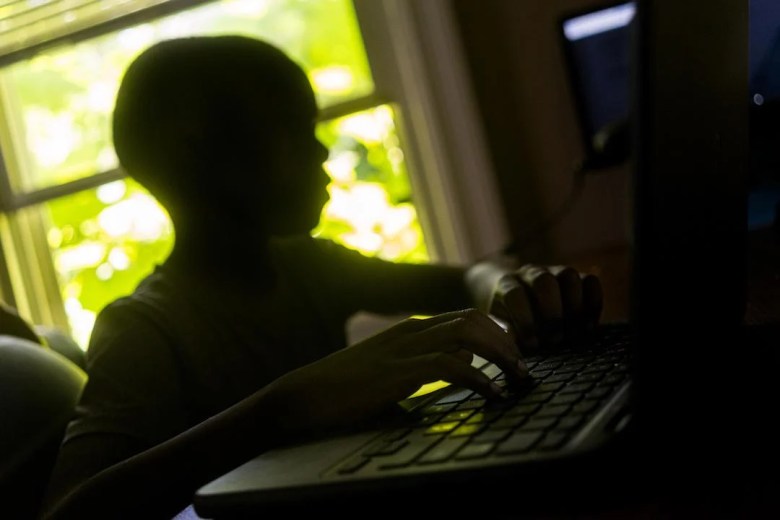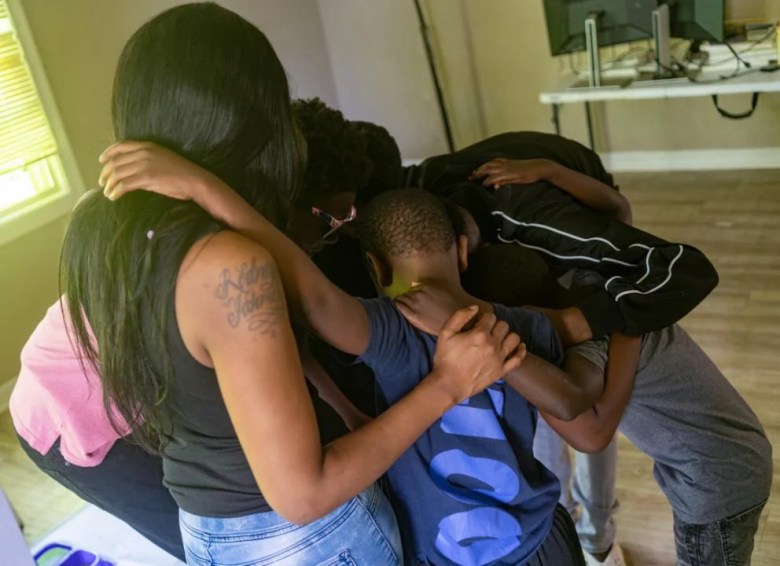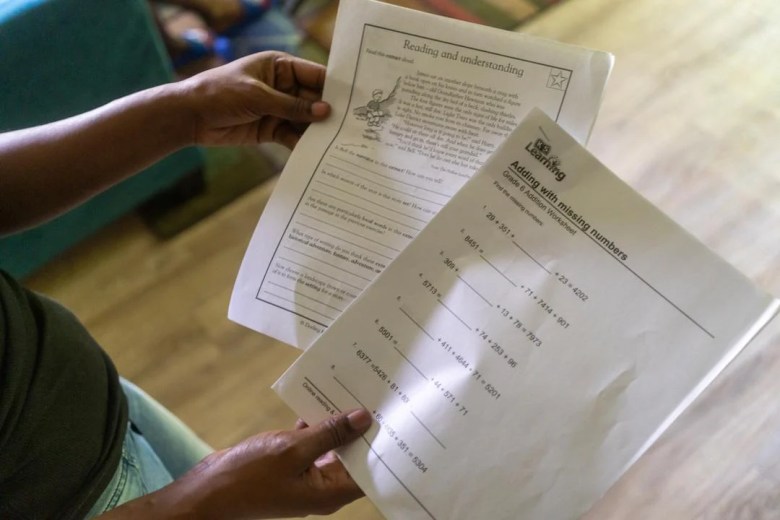#NNPA BlackPress
The newest form of school discipline: Kicking kids out of class and into virtual learning
THE AFRO —
The post The newest form of school discipline: Kicking kids out of class and into virtual learning first appeared on BlackPressUSA.
Published
2 years agoon
By
AFRO Staff
Written by Carly Graf | The AFRO
The newest form of school discipline: Kicking kids out of class and into virtual learning
It wasn’t the first time Ventrese Curry’s granddaughter had gotten into trouble at school. A seventh grader at a charter school in St. Louis, Missouri, she had a long history of disrupting her classes and getting into confrontations with teachers. Several times, the school issued a suspension and sent Curry’s granddaughter home.
In each instance, the school followed state law: The punishment was officially recorded and assigned a set length of time, Curry was formally notified and she and her granddaughter had a chance to appeal the decision.
But one day in February, after refusing to go into her classroom and allegedly cursing at her teachers, the seventh grader was sent home to learn online indefinitely. Curry said she wasn’t given any sense of when her granddaughter would be able to return to the classroom, just that the school and administrators would determine the best learning environment for her. In the meantime, the middle schooler would be left to keep up with her schoolwork on her own, on a district-issued tablet that Curry says would often lock her granddaughter out.
“They’d rather send her home than work on the issues she was going through,” Curry said. “She missed out on a lot of work, a whole lot. It makes me feel bad. It wasn’t fair at all, the way they were treating her.”
Lawyers and advocates across the country say that the practice of forcing a student out of the physical school building and into online learning has emerged as a troubling — and largely hidden — legacy of the pandemic’s shift to virtual learning. Critics charge that these punishments can deprive students and their families of due process rights. Students risk getting stuck in deficient online programs for weeks or even months without the support they need and falling behind in their academics. Sometimes, there is no system in place for tracking how many students are being punished this way or how many days of in-person classroom learning they are forced to miss.
“We are speaking about an equal right, an equal opportunity to access education,” said Sabrina Bernadel, legal counsel at the National Women’s Law Center. “Instead of taking traditional or legal pathways,” she said, “there’s a pattern that the easiest solution is to remove a student rather than deal with the underlying issues.”
The Hechinger Report dives into how school districts across the US have begun punishing students by forcing them into online classes, sometimes indefinitely.
In 2020, nearly every school district in the nation was forced to come up with a way of providing education online. Later, as students returned to in-school learning, that infrastructure remained, making it easier than ever for districts to remove students from the classroom but say they were still educating them. The pandemic showed, however, that the quality of virtual instruction varies greatly and that online classes work best for only a minority of students; vast learning loss and student setbacks resulted.
Still, districts nationwide are now placing students in online learning in response to misbehavior, in a process referred to in certain circles as “virtualization.”

Zachary Clingenpeel for The Hechinger Report
Some school districts consider virtual learning an alternative to discipline — not a form of discipline itself. Other districts embrace virtualization as a disciplinary measure and have started to develop official policies around using this punishment.
‘Virtualization’ has been employed in several school districts; its effects are a source of much debate
Photo: During the months that Rosalind Crawford’s sons were out of school, on virtual learning for disciplinary reasons, she tried her best to keep them on track academically but says they still fell behind in all their subjects.
In Clayton County School District, outside Atlanta, “misdeeds” committed by a student can lead to mandatory online learning until “behavior challenges are identified and mitigated,” according to a statement provided over email by Charles White, a district spokesperson. He said that virtual assignments are intended to be temporary and not to serve as in-school suspensions “or elimination of the expected learning experience.”
In Toppenish School District in Washington State, serving Yakima County, however, the transfer of a student to online learning for 10 to 20 school days is used as a top-tier disciplinary sanction, according to its student handbook. This action is considered a “long-term out-of-school suspension” and is to be used only after a number of other less drastic methods have failed to achieve behavior change, the handbook says. The district did not respond to requests for comment.
Paula Knight, superintendent of Jennings School District in Missouri, said students can be placed in online learning for anywhere from a few hours to a full semester as a punishment, calling the virtual option a “game changer” in how the district is able to deliver instruction.
An afternoon away from the classroom in virtual learning is “almost like a restoration practice, giving them an opportunity to cool down or cool off,” Knight said. For other students, virtualization has its “pluses and minuses,” she said. “It just depends. When the kids are academically on target, for example, you don’t want them to lose that momentum, and we allow as an option.”

Rosalind Crawford and her five sons hug each other in their Greater St. Louis area home on June 10, 2023. Zachary Clingenpeel for The Hechinger Report
Knight said that online learning has not yet been written into the district’s disciplinary code, but that there are plans to incorporate it more formally at some point. Currently, students are recommended for involuntary virtual learning by the principal, she said, and these placements are tracked aggregately along with suspensions, which makes identifying the particular impact of virtualization difficult.
The education provided via virtualization is inconsistent, and most schools using it are not able to track student progress or even how many students are subject to it
Photo: Rosalind Crawford and her five sons hug each other in their Greater St. Louis area home on June 10, 2023. The boys have shared the space since October for virtual learning after they were sent home indefinitely by their school district.
Rosalind Crawford moved her five young boys, all in elementary and middle school, to Jennings, just north of St. Louis, in the spring of 2022. A single mom, Crawford left her longtime home of Memphis to get her family away from gun violence near their home. She enrolled her boys in the local schools that April.
It wasn’t long before she started hearing about two of the boys getting into trouble. Crawford said she could see that they were dealing with trauma and struggling to behave in school as a result. She also believes they were being bullied. She says she met with administrators several times to raise concerns about her kids’ relationships with their peers and their performance in school.
After a fight broke out involving two of her children and other classmates in October 2022, Crawford and her lawyers say all five of her kids were placed on virtual learning.
Jennings School District officials did not respond to follow-up questions about Crawford’s case, but a letter addressed to the family said that the boys were transferred to home-school learning at Crawford’s request. She denies making this request and says she sought legal help to get them back into school.
In the meantime, Crawford said, the boys were provided with laptops and Google Classroom access.
For the better part of the school year, they tried to learn from home. Crawford says that sometimes they only received two lessons per week and that there was no teacher instruction, which made it hard for them to learn. She watched as they fell behind in everything from academic courses to physical education. Her sixth grader soon was at risk of being unable to move up to seventh grade in fall 2023.
“I feel like a failure. How do you tell your kids — when you see the devastation — that this isn’t their fault?” Crawford said. “Virtual learning is basically putting the kids somewhere have to deal with them.”
Ventrese Curry’s granddaughter was also in danger of falling behind due to the amount of schoolwork she missed while learning virtually, her grandmother said. In all, she missed nearly a month of school.
“They never gave her homework. I was calling every day asking if they could give me a package of her work,” she said. “They were telling me she might have to repeat the same grade.”
The school did not respond to multiple requests for comment.
The stakes of such discipline playing out in schools across the country “are fairly enormous,” said Sara Zier from TeamChild, a youth advocacy organization in Washington State that also provides legal services. Lost classroom time reduces social and emotional skills, hinders academic progress and can decrease a student’s likelihood of graduating; lower levels of education can lead to lower employment and financial prospects in adulthood. “It’s not something we can solve by representing one kid at a time,” she said. “It’s a much bigger challenge.”
Yet because many schools don’t separate virtualization from other suspensions or, in some cases, even record it as a removal from the classroom, it’s almost impossible to know how often it’s happening and to whom.
For example, although Clayton County uses virtual learning as a disciplinary tool, the district has no records of how many students have been put into online programs involuntarily.
Hopey Fink, a lawyer at Legal Services of Eastern Missouri, said, “We suspect that there is an attempt to obscure and euphemize the suspension data that’s kind of embedded in part of this” in order to evade accountability. Without data, advocates like Fink worry that disproportionate disciplinary measures against already marginalized groups could be hiding in plain sight.
Typically, discipline overwhelmingly and disproportionately affects students of color and students with disabilities. Research from the UCLA Center for Civil Rights Remedies, using data from the 2015-16 school year, concluded that Black students lost 103 days of learning per 100 students, 82 more days than their white peers. Another study found that Latino students were more likely to receive disciplinary action than white students. U.S. Department of Education data from the 2017-18 school year shows that students with disabilities accounted for 16 percent of total enrollment but received 25 percent of in-school suspensions and 28 percent of out-of-school suspensions. Disparities for Black students with disabilities were even worse.

Rosalind Crawford holds two worksheets she printed off for her sons to supplement their education after all five were indefinitely sent home for virtual learning by their school district.
“We can only extrapolate” that disparities are comparable in other newer forms of discipline, such as virtualization, said Bernadel of the National Women’s Law Center. “Without formal data, we can’t speak to that directly and address that problem, and it’s a huge issue.”
The return to in-class learning after virtualization presents an additional burden on students already struggling to keep up
Photo: Rosalind Crawford holds two worksheets she printed off for her sons to supplement their education after all five were indefinitely sent home for virtual learning by their school district.
Getting back into the classroom after being placed on virtual learning can be more difficult than returning after a suspension. Lawyers in Washington State say clients have been required to make behavioral and academic improvement in a virtual setting before returning to the classroom, and when students do return, they’re typically saddled with cumbersome and alienating rules.
Documents show a laundry list of requirements that a middle-schooler in Washington’s Toppenish School District would need to re-enroll in brick-and-mortar classes: pick-up and drop-off in the main office; random student searches; escorted transition times five minutes before class is over; and chaperoned bathroom trips with a staff member, among others.
For Crawford’s children to return to the classroom in the Jennings School District, she and two of her sons were required to participate in a conflict resolution program through the St. Louis County Juvenile Courts, according to a November 7, 2022, letter from the Jennings School District superintendent and security director. Failure to do so risked “further disciplinary action” that could result in “virtual learning for the remainder of the 2022-2023 school year.”
In all, it took nearly five months and a lawyer’s involvement for Crawford to get her kids reenrolled. The boys also needed to sign a behavior contract, but were ultimately admitted back into the classroom in March.
Indeed, family and student advocates say that the legal credibility of this practice of virtualization is fragile. If families are able to get legal support, school districts tend to quickly allow the student to re-enroll, said Maggie Probert from Legal Services of Eastern Missouri. But even free legal aid can be difficult for already-vulnerable families to access.
Probert worked with Curry to get her granddaughter back into her regular classes after more than three weeks of online learning.
“I have worked on a lot of cases where the attorney gets involved, and suddenly the school lets the kids back in, no questions asked,” Probert said. “They aren’t making any arguments as to why the child should be out of school — because they have none.”
This story was produced by The Hechinger Report, a nonprofit, independent news organization focused on inequality and innovation in education, and reviewed and distributed by Stacker Media.
The post The newest form of school discipline: Kicking kids out of class and into virtual learning appeared first on AFRO American Newspapers .
The post The newest form of school discipline: Kicking kids out of class and into virtual learning first appeared on BlackPressUSA.
AFRO Staff
You may like
-


Why Black Parents Should Consider Montessori
-


LIVE from the NMA Convention Raheem DeVaughn Says The Time Is Now: Let’s End HIV in Our Communities #2
-


VoChill
-


Don Lemon Made the Headlines, but Georgia Fort’s Arrest Shows No Journalist Is Safe
-


Black Educators, Others Reimagine Future of Education
-


OP-ED: Economic Empowerment Has Always Been a Part of Black History
#NNPA BlackPress
COMMENTARY: The National Protest Must Be Accompanied with Our Votes
Just as Trump is gathering election data like having the FBI take all the election data in Georgia from the 2020 election, so must we organize in preparation for the coming primary season to have the right people on ballots in each Republican district, so that we can regain control of the House of Representatives and by doing so, restore the separation of powers and balance that our democracy is being deprived of.
Published
2 weeks agoon
February 10, 2026By
Oakland Post
By Dr. John E. Warren, Publisher San Diego Voice & Viewpoint Newspaper
As thousands of Americans march every week in cities across this great nation, it must be remembered that the protest without the vote is of no concern to Donald Trump and his administration.
In every city, there is a personal connection to the U.S. Congress. In too many cases, the member of Congress representing the people of that city and the congressional district in which it sits, is a Republican. It is the Republicans who are giving silent support to the destructive actions of those persons like the U.S. Attorney General, the Director of Homeland Security, and the National Intelligence Director, who are carrying out the revenge campaign of the President rather than upholding the oath of office each of them took “to Defend The Constitution of the United States.”
Just as Trump is gathering election data like having the FBI take all the election data in Georgia from the 2020 election, so must we organize in preparation for the coming primary season to have the right people on ballots in each Republican district, so that we can regain control of the House of Representatives and by doing so, restore the separation of powers and balance that our democracy is being deprived of.
In California, the primary comes in June 2026. The congressional races must be a priority just as much as the local election of people has been so important in keeping ICE from acquiring facilities to build more prisons around the country.
“We the People” are winning this battle, even though it might not look like it. Each of us must get involved now, right where we are.
In this Black History month, it is important to remember that all we have accomplished in this nation has been “in spite of” and not “because of.” Frederick Douglas said, “Power concedes nothing without a struggle.”
Today, the struggle is to maintain our very institutions and history. Our strength in this struggle rests in our “collectiveness.” Our newspapers and journalists are at the greatest risk. We must not personally add to the attack by ignoring those who have been our very foundation, our Black press.
Are you spending your dollars this Black History Month with those who salute and honor contributions by supporting those who tell our stories? Remember that silence is the same as consent and support for the opposition. Where do you stand and where will your dollars go?
Oakland Post
#NNPA BlackPress
Why Black Parents Should Consider Montessori
BLACKPRESSUSA NEWSWIRE — I have found that there are some educational approaches that consistently provide a safer, more enriching, and more affirmative environment for Black children. The Montessori method, developed by Italian physician Maria Montessori and introduced to the U.S. in the early 20th century, is one such approach.
Published
3 weeks agoon
February 9, 2026By
Oakland Post
As a mother of four children, I’ve done A LOT of school shopping. I don’t mean the autumn ritual of purchasing school supplies. I mean shopping for schools – pouring over promotional materials, combing through websites, asking friends and community members for referrals to their favorite schools, attending open houses and orientations, comparing curriculums and educational philosophies, meeting teachers and principals, and students who all claim that their school is the best.
But keep in mind – I’m not just a mom of four children. I’m a mom of four Black children, and I’m also a psychologist who is very interested in protecting my little ones from the traumatic experience that school can too often become.
For Black children in the United States, school can sometimes feel more like a prison than an educational institution. Research shows that Black students experience school as more hostile and demoralizing than other students do, that they are disciplined more frequently and more harshly for typical childhood offenses (such as running in the halls or chewing gum in class), that they are often labeled as deviant or viewed as deficient more quickly than other children, that teachers have lower academic expectations of Black students (which, in turn, lowers those students’ expectations of themselves), and that Black parents feel less respected and less engaged by their children’s teachers and school administrators. Perhaps these are some of the underlying reasons that Black students tend to underperform in most schools across the country.
The truth is that schools are more than academic institutions. They are places where children go to gain a sense of who they are, how they relate to others, and where they fit into the world. The best schools are places that answer these questions positively – ‘you are a valuable human being, you are a person who will grow up to contribute great things to your community, and you belong here, with us, exploring the world and learning how to use your gifts.’ Unfortunately, Black children looking for answers to these universal questions of childhood will often hit a brick wall once they walk into the classroom. If the curriculum does not reflect their cultural experiences, the teachers don’t appear to value them, and they spend most of their time being shamed into compliance rather than guided towards their highest potential, well…what can we really expect? How are they supposed to master basic academic skills if their spirits have been crushed?
Here’s the good news. In my years of school shopping, and in the research of Black education specialists such as Jawanza Kunjufu and Amos Wilson, I have found that there are some educational approaches that consistently provide a safer, more enriching, and more affirmative environment for Black children. The Montessori method, developed by Italian physician Maria Montessori and introduced to the U.S. in the early 20th century, is one such approach.
The key feature of Montessori schooling is that children decide (for the most part) what they want to do each day. Led by their own interests and skill levels, children in a Montessori classroom move around freely and work independently or with others on tasks of their own
choosing. The classroom is intentionally stocked with materials tailored to the developmental needs of children, including the need to learn through different senses (sight, touch/texture, movement, etc.). The teacher in a Montessori classroom is less like a boss and more like a caring guide who works with each child individually, demonstrating various activities and then giving them space to try it on their own. The idea is that over time, students learn to master even the toughest tasks and concepts, and they feel an intense sense of pride and accomplishment because they did it by themselves, without pressure or pushing.
I think that this aspect of the Montessori method is good for all kids. Do you remember the feeling of having your creativity or motivation crushed by being told exactly what to do, when to do it, how to do it, and why? The truth is that when presented with a new challenge and then given space, children actually accomplish a lot! They are born with a natural desire to learn. It is that spirit of curiosity, sense of wonder, and excitement to explore that Montessori helps to keep alive in a child. But that’s not the only reason that I think Black parents need to consider Montessori.
Fostering a love of learning is great. But more importantly, I think that Montessori students excel at learning to love. It begins with Montessori’s acknowledgement that all children are precious because childhood is a precious time. In many school systems, Black children are treated like miniature adults (at best) or miniature criminals (at worst), and are subjected to stressful situations that no kids are equipped to handle – expectations to be still and silent for long periods, competitive and high-stakes testing, and punitive classroom discipline. It’s easy to get the sense that rather than being prepared for college or careers, our children are being prepared to fail. Couple this with the aforementioned bias against Black children that seems to run rampant within the U.S. school system, and you end up with children who feel burned out and bitter about school by the time they hit 3rd grade.
In my experience, Montessori does a better job of protecting the space that is childhood – and all the joy of discovery and learning that should come along with that. Without the requirement that students “sit down and shut up,” behavioral issues in Montessori classrooms tend to be non-existent (or at least, the Montessori method doesn’t harp on them; children are gently redirected rather than shamed in front of the class). Montessori students don’t learn for the sake of tests; they demonstrate what they’ve learned by sharing with their teacher or classmates how they solve real-world problems using the skills they’ve gained through reading, math, or science activities. And by allowing children a choice of what to focus on throughout the day, Montessori teachers demonstrate that they honor and trust children’s natural intelligence. The individualized, careful attention they provide indicates to children that they are each seen, heard, and valued for who they are, and who they might become. Now that’s love (and good education).
As a parent, I’ve come to realize that many schools offer high-quality academics. Montessori is no different. Students in Montessori schools gain exposure to advanced concepts and the materials to work with these concepts hands-on. Across the nation, Montessori schools emphasize early literacy development, an especially important indicator of life success for young Black boys and men. Montessori students are provided with the opportunity to be
successful every day, and the chance to develop a sense of competence and self-worth based on completing tasks at their own pace.
But I have also learned that the important questions to ask when school shopping are often not about academics at all. I now ask, ‘Will my children be treated kindly? Will they be listened to? Protected from bias and bullying? Will they feel safe? Will this precious time in their lives be honored as a space for growth, development, awe, and excitement? Will they get to see people like them included in the curriculum? Will they be seen as valuable even if they don’t always ‘measure up’ to other kids on a task? Will they get extra support if they need it? Will the school include me in major decisions? Will the school leaders help to make sure that my children reach their fullest potential? Will the teacher care about my children almost as much as I do?’
Consistently, it’s been the Montessori schools that have answered with a loud, resounding ‘Yes!’ That is why my children ended up in Montessori schools, and I couldn’t be happier with that decision. If you’re a parent like me, shopping for schools with the same questions in mind, I’d urge you to consider Montessori education as a viable option for your precious little ones. Today more than ever, getting it right for our children is priceless.
Oakland Post
#NNPA BlackPress
LIVE from the NMA Convention Raheem DeVaughn Says The Time Is Now: Let’s End HIV in Our Communities #2
Set against the backdrop of the NMA conference, Executive Officers from the National Medical Association, Grammy Award Winning Artist and Advocate Raheem DeVaughn, and Gilead Sciences experts, are holding today an important conversation on HIV prevention and health equity. Black women continue to be disproportionately impacted by HIV despite advances in prevention options. Today’s event […]
Published
3 weeks agoon
February 3, 2026By
Oakland Post
Set against the backdrop of the NMA conference, Executive Officers from the National Medical Association, Grammy Award Winning Artist and Advocate Raheem DeVaughn, and Gilead Sciences experts, are holding today an important conversation on HIV prevention and health equity.
Black women continue to be disproportionately impacted by HIV despite advances in prevention options. Today’s event is designed to uplift voices, explore barriers to access, and increase awareness and key updates about PrEP, a proven prevention method that remains underutilized among Black women. This timely gathering will feature voices from across health, media, and advocacy as we break stigma and center equity in HIV prevention.
Additional stats and information to know:
● Black women continue to be disproportionately affected by HIV, with Black women representing more than 50% of new HIV diagnoses among women in the U.S. in 2022, despite comprising just 13% of women in the U.S.
● Women made up only 8% of PrEP users despite representing 19% of all new HIV diagnoses in 2022.
● Gilead Sciences is increasing awareness and addressing stigma by encouraging regular HIV testing and having judgment-free conversations with your healthcare provider about prevention options, including oral PrEP and long-acting injectable PrEP options.
● PrEP is an HIV prevention medication that has been available since 2012.
● Only 1 in 3 people in the U.S. who could benefit from PrEP were prescribed a form of PrEP in 2022.
Oakland Post
SEARCH POST NEWS GROUP
CHECK OUT THE LATEST ISSUE OF THE OAKLAND POST

ADVERTISEMENT
WORK FROM HOME
Home-based business with potential monthly income of $10K+ per month. A proven training system and website provided to maximize business effectiveness. Perfect job to earn side and primary income. Contact Lynne for more details: Lynne4npusa@gmail.com 800-334-0540


CITY OF SAN LEANDRO STATE OF CALIFORNIA PUBLIC WORKS DEPARTMENT ENGINEERING DIVISION NOTICE TO BIDDERS FOR ANNUAL STREET OVERLAY/REHABILITATION 2019-21 – PHASE III

Oakland Post: Week of February 11 = 17, 2026

Rising Optimism Among Small And Middle Market Business Leaders Suggests Growth for California

Discrimination in City Contracts

COMMENTARY: The National Protest Must Be Accompanied with Our Votes

Congresswoman Simon Votes Against Department of Homeland Security, ICE Funding

Post Newspaper Invites NNPA to Join Nationwide Probate Reform Initiative

Community Celebrates Turner Group Construction Company as Collins Drive Becomes Turner Group Drive

New Bill, the RIDER Safety Act, Would Support Transit Ambassadors and Safety on Public Transit

Trump’s White House Pushes to Control California Wildfire Recovery

Gov. Newsom, AG Bonta to Local Law Enforcement: You Have Authority to Investigate Federal Agents

Dorothy Lee Bolden: Uniting Domestic Workers

Cracking Down on Human Trafficking, California DOJ Announces 120 Arrests

COMMENTARY: The Biases We Don’t See — Preventing AI-Driven Inequality in Health Care

California Launches Study on Mileage Tax to Potentially Replace Gas Tax as Republicans Push Back

Life Expectancy in Marin City, a Black Community, Is 15-17 Years Less than the Rest of Marin County

Oakland Post: Week of January 28, 2025 – February 3, 2026

Jefferson County (AL) Democrats Open Qualifying for 2026 Primary Elections

Skater Emmanuel Savary Sharpens Routines for the 2026 U.S. Championships

COMMENTARY: With Gratitude and Praise for 2026

Community Celebrates Turner Group Construction Company as Collins Drive Becomes Turner Group Drive

California Launches Study on Mileage Tax to Potentially Replace Gas Tax as Republicans Push Back

Oakland Post: Week of January 21 – 27, 2026

Discrimination in City Contracts

OP-ED: The Dream Cannot be Realized Without Financial Freedom

From Civil Rights to ICE Raids, Trump’s Unchecked Power Puts Every Community at Risk

After Don Lemon’s Arrest, Black Officials Raise Concerns About Independent Black Media

From Civil Rights to ICE Raids, Trump’s Unchecked Power Puts Every Community at Risk

Travis Scott Teaches Us How to Give Forward

Four Stolen Futures: Will H-E-B Do The Right Thing?

Hyundai Ioniq 5 Parking, Safety, and 360 View #shorts

2025 Ioniq 5 New Wiper & Powerful Performance! #shorts

Electric SUV Range: Is 259 Miles Enough? #shorts

EV Charging: How Fast Can You Charge an Electric Vehicle? #shorts

Biometric Cooling… Messaging Seats…Come on! 2025 Infiniti QX80 Autograph 4WD

Charged Up: Witness the Magic of a Fully Electric Car! #shorts

Range Rover Sport PHEV Included…: See What’s Inside This Luxury SUV! #shorts

Invisible Hood View: Perfect Parking with X-Ray Vision! #shorts

AI Is Reshaping Black Healthcare: Promise, Peril, and the Push for Improved Results in California

ESSAY: Technology and Medicine, a Primary Care Point of View

Sanctuary Cities

The RESISTANCE – FREEDOM NOW

STATE OF THE PEOPLE: Freddie

ECONOMIC BOYCOTT DAY!!!!!

I told You So
Trending
-

 Activism3 weeks ago
Activism3 weeks agoLife Expectancy in Marin City, a Black Community, Is 15-17 Years Less than the Rest of Marin County
-

 Activism3 weeks ago
Activism3 weeks agoOakland Post: Week of January 28, 2025 – February 3, 2026
-

 Activism2 weeks ago
Activism2 weeks agoCommunity Celebrates Turner Group Construction Company as Collins Drive Becomes Turner Group Drive
-

 Business2 weeks ago
Business2 weeks agoCalifornia Launches Study on Mileage Tax to Potentially Replace Gas Tax as Republicans Push Back
-

 Activism2 weeks ago
Activism2 weeks agoDiscrimination in City Contracts
-

 Activism3 weeks ago
Activism3 weeks agoAfter Don Lemon’s Arrest, Black Officials Raise Concerns About Independent Black Media
-

 Activism3 weeks ago
Activism3 weeks agoMedi-Cal Cares for You and Your Baby Every Step of the Way
-

 Arts and Culture2 weeks ago
Arts and Culture2 weeks agoBook Review: Books on Black History and Black Life for Kids




